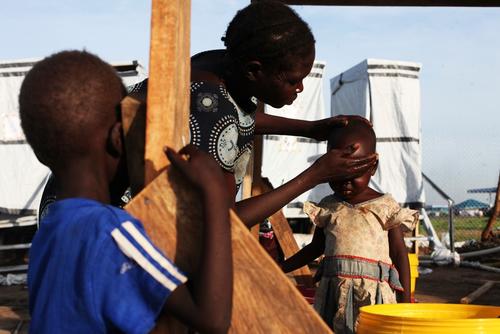Since the South Sudanese Ministry of Health declared a cholera outbreak in Juba, the country’s capital, on 15 May 2014, more than 1,300 patients have been treated for the disease, and 29 people have died.
Returning for cholera treatment
This week, Mary Keji rushed to MSF’s Cholera Treatment Centre (CTC) with her two children, Matthew, four years old, and Ludia, two and a half years old. Both had fallen sick within hours of each other. Matthew began to vomit and later to have serious diarrhea. Just a few hours afterwards Ludia too fell ill.
“As Matthew became worse, I started to worry. Then Ludia started to get sick, and I was afraid. I had heard there was cholera in Juba, and I knew it was serious. People said there was treatment in the main hospital (Juba Teaching Hospital), but it was too far away from me to get to. I live on the other side of the city and didn’t have any money to pay a driver to take me to that hospital.
'They kept getting worse'
I rushed to my uncle nearby and he was able to lend me 5 SSD (less than US $2) to buy some treated water for the children. Still they kept getting worse. I was troubled but I didn’t have enough for a bus or taxi. Then some neighbours told me that they had heard that an organization had built a special clinic for cholerain our area. I picked up my children, and carried them here - Matthew on my back, andLudia in my arms.
When I got to this clinic the doctors gave both of them special water to drink.Ludia started to get better, butnot Matthew. He stopped wanting to drink and became weak. So, they moved us to this tent. They put a needle in Matthew’sarm with astronger liquid to help him. They say he will be better soon.
'You must watch your children'
My message to the people is to keep everything clean. Don’t let your children play with dirty water or drink water that you don’t prepare. Boil it for a long time. Be careful, even with eating fruits like mangoes and bananas. Now that cholera is here in Juba, you must watch your children. If you see signs like vomiting or diarrhea then you must try to rush them to a special centre like this one.
If this clinic wasn’t here, I don’t know what I could have done. I would have had to wait. And just hope that they would somehow recover.”
Matthew and his younger sister, Ludia, were both successfully discharged from MSF’s cholera treatment centre a few days later, and able to return home with their mother Mary.
Children especially vulnerable
Cholera causes profuse diarrhoea and vomiting, which can lead to death by intense dehydration, sometimes within a matter of hours. Children are especially vulnerable, and need immediate treatment. Cholera is treated simply and successfully by immediately replacing the fluids and salts lost through vomiting and diarrhoea – with prompt rehydration, fewer than one per cent of cholera patients die.
Cholera victims are always treated with oral rehydration solutions - prepackaged mixtures of sugars and salts that are mixed with water and drunk in large amounts. Severe cases will need to be medically rehydrated intravenously via a drip, and antibiotics are sometimes administered.



